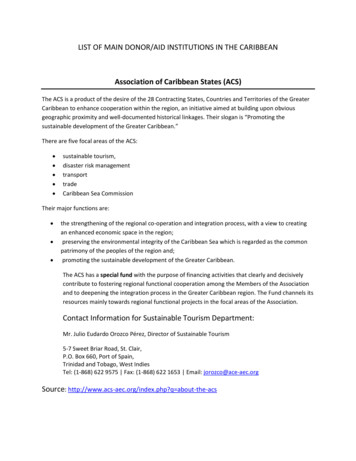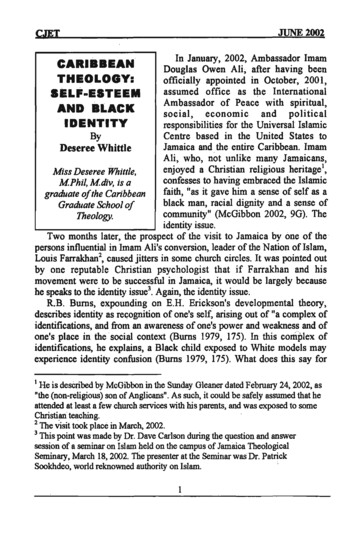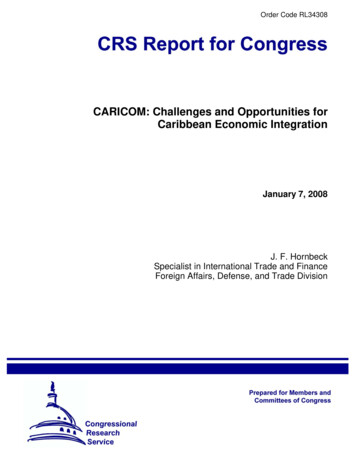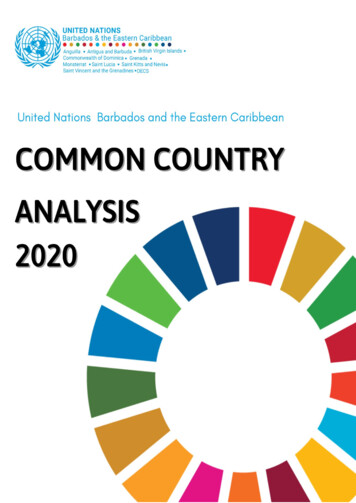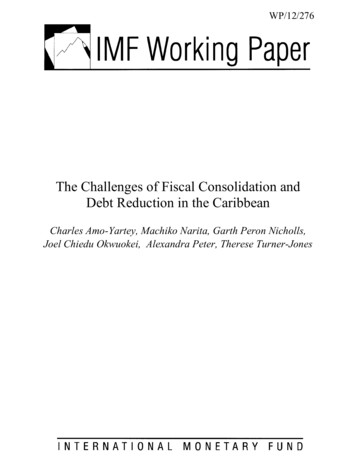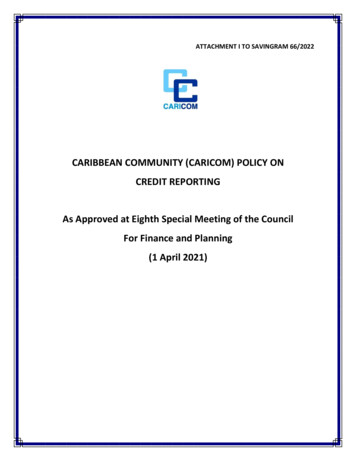
Transcription
ATTACHMENT I TO SAVINGRAM 66/2022CARIBBEAN COMMUNITY (CARICOM) POLICY ONCREDIT REPORTINGAs Approved at Eighth Special Meeting of the CouncilFor Finance and Planning(1 April 2021)
CARRIBBEAN COMMUNITY (CARICOM) POLICYON CREDIT REPORTINGCONTENTSExecutive Summaryiii1.Purpose12.Introduction13.Contemporary Credit Reporting Systems34.Policy Overview74.1Regional Context74.2National Context94.3Cross-Border Credit Reporting114.4Data Protection and Consumer Protection within the Context ofCredit Reporting125.Objectives of the CARICOM Policy on Credit Reporting146.Strategies for Implementing the CARICOM Policy on Credit Reporting156.16.26.36.46.5General Principles and International Standards for CreditReporting and Data Protection15Strategy 1: Establishing a Modern Credit Reporting Regime inCARICOM Member States16Strategy 2: Improving Practices for Credit Risk Assessment towardsMore Efficient Credit Allocation in CARICOM Member States21Strategy 3: Establish Standard Provisions for Privacy and DataProtection with respect to the Acquisition and Use of CreditInformation in CARICOM Member States23Strategy 4: Promote Regulatory Cooperation and Coordinationamong the Designated Supervisory Authority in Member States onMatters Relating to Cross-Border Credit Reporting26
CARRIBBEAN COMMUNITY (CARICOM) POLICYON CREDIT REPORTING6.67.Impact Assessment7.18.Supporting Measures2728Nexus between Efficient Credit Reporting Markets andFinancial Development287.2Implications for Public Private Sector Partnership297.3Policy Implementation, Monitoring and Evaluation30Conclusion30ANNEXES:Annex IAnnex IIAnnex IIIGlossaryGeneral Principles for Credit ReportingPossible Modes for Cross-Border Credit Reportingii
CARRIBBEAN COMMUNITY (CARICOM) POLICYON CREDIT REPORTINGEXECUTIVE SUMMARYThe Caribbean Community (CARICOM) Policy on Credit Reporting promotes the establishmentof a harmonised legal framework for regulating the credit reporting system in Member Statesand facilitating the cross-border exchange of credit information as an important component ofthe infrastructure for the effective functioning of the CARICOM Single Market and Economy(CSME). The Policy is aimed at promoting the modernization and efficient functioning of thecredit market in Member States within an environment of optimal risk management and theprotection of the rights of the consumer. An effective credit reporting system enables better riskmanagement and credit decisions and incentivises borrowers to engage in better paymentbehaviour thereby contributing to financial inclusion and stability.State of Play of Credit Reporting in CARICOM Member States. Credit reporting refers to thecollection, collating, scoring and dissemination of credit information by credit bureaus and creditregistries. Contemporary credit reporting systems are generally established under a facilitativelegal and regulatory framework which is proportionate and predictable while promotingtransparency, non-discrimination and the protection of consumer rights. However, regulatedcredit reporting systems in CARICOM are a relatively new feature of the financial landscape.Within the last three years, legislated credit reporting regimes, which had previously existed inonly two (2) Member States, have emerged or are about to be established in all CARICOMMember States. Notwithstanding, these regimes are all operable within national boundaries(except the OECS which has a sub-regional framework) and do not allow for cross-borderexchange of credit information.Objectives of the CARICOM Policy. Against this background and within the context of Articles44, 71 and 186 of the Revised Treaty of Chaguaramas, the main objectives of the CARICOM Policyon Credit Reporting are to (i)Establish a modern credit reporting regime for regulating credit bureaus and mattersrelating to credit reporting as well as facilitating cross-border sharing of creditinformation;(ii)Improve practices regarding credit risk assessment towards more efficient and optimalcredit allocation decisions;iii
CARRIBBEAN COMMUNITY (CARICOM) POLICYON CREDIT REPORTING(iii)Establish standard provisions for data privacy and protection1 as they pertain to the useof personal, financial and other information for credit reporting purposes in accord withinternational standards and best practices; and(iv)Promote regulatory co-operation and coordination among the designated SupervisoryAuthorities in Member States, on matters relating to cross-border credit reporting.The implementation of the CARICOM Policy on Credit Reporting will involve the design andadoption of an appropriate harmonised legal and regulatory framework for the functioning ofthe credit reporting system in Member States. The CARICOM credit reporting regime reflectsinternational best practices and is informed by the general principles and international standardsfor credit reporting, data protection and privacy. Accordingly, the Policy sets out four (4) broadstrategies for adoption and implementation by CARICOM Member States.Establishing a Modern Credit Reporting Regime in CARICOM Member States. In accord with thegeneral principles (Annex II), the CARICOM Policy advocates that all credit reporting activities willbe regulated and supervised by each Member State in accord with applicable domestic law and,in this regard, a CARICOM model law will be formulated for adoption by Member States. TheModel Law will, inter alia, set out the institutional requirements and procedures for regulationand supervision of the credit reporting system; prescribe the minimum requirements for theoperation of credit bureaus as well as the roles and responsibilities of relevant market players.In addition, the Model Law will set out the procedures that will facilitate cross-border creditreporting via the four (4) possible modes that have been identified – Direct Access, IndirectAccess, Report Portability and Right of Access. The CARICOM Policy proposes that market playersmay wish to initiate formal cross-border exchanging of credit information through the portabilityand right of access modes which could then evolve into the development of full-scale regionalnetworks as the appropriate scale of demand materializes.Improving Practices for Credit Risk Assessment towards more Efficient Credit Allocation inCARICOM States. A prerequisite for modern credit reporting systems is enabling theestablishment and operation of credit bureaus as a key player in the financial sector riskarchitecture. All credit bureaus in CARICOM Member States must therefore be licensed andregulated by the supervisory authority and will be permitted to conduct only those credit1 These provisions are enshrined in the proposed CARICOM Model Legislation on Privacy and Data Protection (HIPCAR Project)which is based on international standards and best practices.iv
CARRIBBEAN COMMUNITY (CARICOM) POLICYON CREDIT REPORTINGreporting activities as specified in the law. In this regard, the CARICOM Policy disallowscompetition between credit bureaus and credit institutions or engaging in purpose creep.However, the Policy promotes the harmonisation of credit reporting frameworks in CARICOMMember States and encourages the standardisation, where possible, of processes andprocedures in respect to the collection, processing and dissemination of credit information. ThePolicy also encourages the standardization of documentation and credit reporting scoringmethodology as well as reporting obligations and requirements.Establish Standard Provisions for Privacy and Data Protection with respect to the Acquisitionand Use of Credit Information in CARICOM States. The transparency of information sharingpractices for all market participants including the regulator is a key feature of well-functioningcredit reporting systems. The CARICOM Policy therefore treats the data protection and privacyrights of the data subject as a matter of priority. Accordingly, the CARICOM Policy advocates forthe adoption of the HIPCAR Policy Guidelines and Model Law on Privacy and Data Protection byMember States. These principles will be embedded in the CARICOM Model Law on CreditReporting which will specify the retention period for data records; the requirement that the datasubject explicitly provides consent for the release of a credit report; the permissible purposes ofcredit reports; and the responsibilities of credit reporting providers regarding the confidentialityof data records.Promote Regulatory Cooperation and Coordination among the Designated SupervisoryAuthority in Member States on Matters Relating to Cross-Border Credit Reporting. Effectivecredit reporting systems which permit the cross-border exchange of credit information willrequire appropriate regulatory and supervisory structures both at the national and regional level.The CARICOM Policy promotes the adoption of appropriate regulatory and supervisoryarrangements to monitor and regulate the activities of credit bureaus domestically as well as tofacilitate cross-border and functional cooperation among supervisory authorities. Specifically,the Policy sets out the broad conditions for cross-border credit information exchange andadvocates for the establishment of a Regional Body of Credit Reporting Supervisors. This Bodywill serve as a coordinating mechanism to provide oversight of credit reporting matters and toadvise the COFAP on developing efficient credit markets in the Community.Supporting Measures and Impact Assessment. The implementation of a modern creditreporting regime would require CARICOM Member States to update their data protection andprivacy laws, modernize their national bankruptcy, insolvency and dispute resolution regimes aswell as pursue the strengthening of their supervisory authority, where necessary. Otherv
CARRIBBEAN COMMUNITY (CARICOM) POLICYON CREDIT REPORTINGsupporting measures include the launching of a comprehensive public education programme andconsideration of the options for the regional adoption of a Single Identification for CARICOMnatural persons.The adoption of a modern credit reporting framework that allows for domestic and cross-borderissuance of credit reports in accord with international standards and best practices will lead tomore transparent and efficient credit markets in the Community. The effective implementationof this framework provides opportunities for public private partnerships to reform the creditreporting environment in Member States and to establish the cross-border procedures for theexchange of credit reports. The CARICOM Policy on Credit Reporting will be reviewed periodicallyto ensure that it remains aligned with global developments, internationally agreed standards andbest practices.vi
CARRIBBEAN COMMUNITY (CARICOM) POLICYON CREDIT REPORTING1.PURPOSE1.1This document sets out the CARICOM Policy on Credit Reporting for the CaribbeanCommunity (CARICOM) Member States. The Policy –(i)seeks to promote the efficient functioning of credit markets within anenvironment of optimal risk management and the protection of consumer rightsin the Caribbean Community; and(ii)represents one of the measures to facilitate the efficient functioning of theCARICOM Single Market and Economy (CSME), which were endorsed forelaboration2 by the Thirty-Third Meeting of the Conference of Heads ofGovernment of the Caribbean Community (St Lucia, July 2012).2.INTRODUCTION2.1The CARICOM Single Market and Economy (CSME) is premised on five (5) fundamentalpillars, namely – the free movement of people, goods and capital; the right ofestablishment and the provision of services. These pillars are set out in the Revised Treatyof Chaguaramas (2001) which underscores the importance of Member States adoptingmeasures to facilitate Establishment, Provision of Services and Movement of Capital(Article 44). The Revised Treaty also identifies the areas for macroeconomic policycoordination and harmonisation which would be supportive of the functioning of theCSME. These areas include monetary policy cooperation (in respect to the free movementof capital), fiscal, financial and investment policy coordination and harmonisation as wellas capital market integration. In particular, Article 71 mandates that the Council forFinance and Planning (COFAP) adopts measures for the establishment of supportivefinancial infrastructure3 in Member States. The Community’s financial2 The endorsement was provided within the context of the Work Programme of areas for Regional Macroeconomic PolicyHarmonisation and Coordination in support of the CSME.3 The International Finance Corporation (IFC) categorizes financial infrastructure as constituting the underlying foundation forthe financial system – including the institutions, information technologies, rules, and standards that enable financialintermediation. Credit bureaus, collateral registries, as well as payments, remittance, and securities settlement systems are allvital parts of a country’s financial infrastructure.1
CARRIBBEAN COMMUNITY (CARICOM) POLICYON CREDIT REPORTINGpolicy cooperation agenda has therefore prioritized, inter alia, the modernization andharmonization of the financial infrastructure in the Community of which the credit marketis an integral component. Moreover, Article 186 of the Revised Treaty “promotes theelaboration, publication and adoption of fair contract terms between suppliers andconsumers of goods and services produced or traded in the CSME.” Together theseprovisions, along with Articles 7 (Non-Discrimination) and 8 (Most Favoured NationTreatment)4 establish the basic parameters for the CARICOM Policy on Credit Reporting.2.2As Member States work towards the establishment of the infrastructure and supportingpolicy framework for the CSME, it has become necessary to focus on creating moreefficient domestic financial markets while strengthening financial systems to promotefinancial stability and inclusion. In this regard, the issue of access to financing forhouseholds and businesses5 has been prioritized within the context of increasing theefficiency of domestic credit markets and promoting economic growth. In addition, thepolicy agenda has been directed towards the establishment and/or regulation of creditbureaus and related credit reporting activities as part of the wider effort to develop thefinancial sector in CARICOM.2.3Credit markets enable individuals to supplement income, smooth consumption, financeeducation and business ventures, and engage in other investment activities. However,the absence of credit risk information on borrowers along with restrictions to the flow ofinformation (referred to as information asymmetry) create market distortions, which leadto sub-optimal decisions in credit markets. Inefficient credit markets are characterised byhigher borrowing costs, the over-reliance on the use of collateral, delayed creditapprovals, reduced access to credit by individuals and businesses as well as creditrationing, which could result in quality projects being under-funded. The availability ofinformation on the credit history of borrowers enables the efficient functioning of creditmarkets.4 Article 7 (Non-Discrimination) states “Within the scope of application of this Treaty and without prejudice to any specialprovisions contained therein, any discrimination on grounds of nationality only shall be prohibited. Also, Article 8 (MostFavoured Nation Treatment) states – “Subject to the provisions of this Treaty, each Member State shall, with respect to anyrights covered by this Treaty, accord to another Member State treatment no less favourable than that accorded to: (a) a thirdMember State; or(b) third States.5 Particularly micro, small and medium-sized businesses.2
CARRIBBEAN COMMUNITY (CARICOM) POLICYON CREDIT REPORTING2.4Against this background, it should be acknowledged that the measures to give effect tothe provisions of the Revised Treaty, in respect to the free movement of capital wereelaborated in the Draft CARICOM Financial Services Agreement (CFSA). This instrument,which is yet to be adopted by Member States, is representative of a blueprint for thedevelopment and orderly integration of the financial sector in CARICOM and identifies keyreforms required to build out the regional financial architecture. Article 7 of the RevisedDraft CFSA commits Member States to “promote a coordinated approach to the regulationof credit reporting activities among them and the cross-border exchange of creditinformation to enhance market transparency and maintain the integrity of the financialservices sector.”6 Member States are also expected to implement measures to supportthe cross-border exchange of credit information. While a CARICOM-wide regional creditbureau is not contemplated at this time, this Policy advocates the adoption of aharmonised legal framework for credit reporting and cross-border exchange of creditinformation within the Community and specifically supports the initiatives by MemberStates to facilitate the establishment of credit bureaus in accord with internationalstandards and best practice.3.CONTEMPORARY CREDIT REPORTING SYSTEMS3.1Credit reporting, which is defined as the intermediation of information on borrowers,promotes the exchange of reliable credit information among market participants and isan important characteristic of the financial infrastructure in countries around the world.Credit Reporting Systems comprise the institutional arrangements, standards rules andprocedures that enable information flows relevant to making decisions on credit and loanagreements. Credit information therefore comprises any electronically stored or paperbased data referring to secured and unsecured loans, advances and other arrangements,whereby a customer of a bank, credit institution or an insurance company has access tofunds or financial guarantees of the entity.7 At their core, credit reporting systems consistof databases of information on debtors, together with the institutional, technological, and6 Caribbean Community Secretariat (2021) – CARICOM Financial Services Agreement (Draft).7 Jentzsch, Nicola (2015) - Explanatory Notes to Draft (CARICOM) Model Law on Credit Reporting, (page 10).3
CARRIBBEAN COMMUNITY (CARICOM) POLICYON CREDIT REPORTINGlegal framework supporting the efficient functioning of these systems.8 The keystakeholders in a credit reporting system are the regulators, financial supervisors, creditreporting service providers (namely: credit bureaus and credit registries), data providers,9users of credit information, and the data-subjects. The credit reporting system is typicallyregulated by the central bank or other designated supervisory authority. However, somecountries have vested this power in an independent body or another government agency.3.2Credit Reporting Service Providers include credit bureaus and credit registries. The mainfunction of these entities is to collect and process information on the payment history ofborrowers and to disseminate this information to credit institutions and other users.Credit bureaus are privately owned commercial enterprises, which tend to cater to theinformation requirements of commercial lenders. Thus, they typically provide additionalvalue-added services such as credit scores and collection services.10 On the other hand,credit registries are usually established and managed by the central bank or anotherdesignated supervisory authority and serve to support the State’s role as a supervisor offinancial institutions. As such, there is usually a legal requirement for credit institutions toregister loans above a stipulated threshold, with the national credit registry. Thesupervisory authority uses the data provided to the credit registry to inform macroprudential regulation and oversight of financial institutions.3.3Credit Information Providers or Data Providers (as they are referred to in the laws ofsome Member States) are key participants in the credit reporting system. These entitiesinclude, inter alia, financial institutions, providers of utilities services (such astelecommunications, electricity, water), co-operatives, retailers, hire purchase companiesand other credit institutions. Public registries may also be designated as creditinformation providers since they collect information that constitutes data subjectinformation. In well-developed markets, credit information providers routinely reportinformation on the credit history of their clients to credit bureaus.8 World Bank, International Finance Corporation (2012) - Credit Reporting Knowledge Guide, Washington, D.C, World Bank,(page 5).9 Data Providers are also referred to as Credit Information Providers in this Policy.10 The World Bank Credit Reporting Guide for 2012 defines ‘data providers’ as creditors and other entities that proactively andin a structured fashion supply information to credit reporting service providers.4
CARRIBBEAN COMMUNITY (CARICOM) POLICYON CREDIT REPORTING3.4Another important group of stakeholders in the credit reporting system are the users ofcredit bureau services. A User is an individual or business that requests credit reports,files or other related services from the credit bureau or credit registry. Users includesubscribers of the credit bureau services and a person who is not a subscriber but whohas received the consent of the Data Subject to access his/her credit report. A Subscriberis a credit information provider that has entered into a subscriber agreement with a creditbureau to furnish data subject information to the credit bureau in an agreed format. Inthis regard, credit information providers perform a dual function in the credit reportingsystem as they are subscribers as well as users of the services of credit bureaus. Otherusers of credit information include financial sector supervisors and central banks, whichutilise this information for strengthening their surveillance of licensed institutions. Inaddition, employers, insurers and landlords may utilise credit reports as a screeningmechanism, where such use is permitted in the jurisdiction’s credit reporting law.3.5Data subjects (or consumers) are inarguably the most important stakeholders in the creditreporting system. A Data Subject is an individual or a business whose data could becollected, processed and disclosed to third parties through the credit reporting system.11The information on the data subject is analysed and a risk rating or credit score is assignedto each data subject. This credit score is then requested by credit institutions and is usedas an input in the credit risk assessment process.3.6In general, a properly functioning and regulated credit reporting system promotestransparency, price efficiency and improved risk assessment. In particular, an effectivecredit reporting system enables credit institutions to better manage credit risk byimproving the dissemination of information on the risks associated with specificborrowers. Additionally, an efficient credit reporting system incentivises borrowers tomake timely repayments since late payments and defaults can reduce their reputationalcollateral. Good payment behaviour empowers individuals and builds a healthy attitudeto managing debt, which in turn, contributes to financial stability.3.7The contemporary trend in the establishment of credit reporting systems is towards thecreation of a facilitative legal and regulatory framework that promotes transparency and11 World Bank (2012) - International Finance Corporation - Credit Reporting Knowledge Guide, Washington D.C., World Bank5
CARRIBBEAN COMMUNITY (CARICOM) POLICYON CREDIT REPORTINGwhich is “clear, predictable, non-discriminatory, proportionate and supportive ofconsumer rights (General Principle 4).”12 Given this principle, the ideal “legal andregulatory framework should enable and promote the development of secure, efficient,and reliable credit reporting systems, while fostering competition in the credit market andprotecting the rights of consumers with respect to their personal information.”13Accordingly, the process of updating or enacting credit reporting laws has been underwayin many countries and more than 33 new laws have been drafted in accord with theseprinciples.3.8In its Doing Business Report, the World Bank awards a higher score to countries, whichhave a functioning credit reporting system (including credit bureaus and public creditregistries) given the critical role of such institutions in promoting access to financialservices. In this regard, the 2019 Doing Business Survey reported that Jamaica, Trinidadand Tobago and Guyana were the top performers in CARICOM in the ‘Getting Creditcategory’ with a ranking of 12, 60 and 8514 respectively out of a total of 190 assessedcountries. These rankings were reflective of Guyana and Jamaica having established alegal and regulatory framework for credit-reporting, while Trinidad and Tobago has a welldeveloped credit market and an unregulated credit bureau which has been in operationsince 2004.3.9Notwithstanding the general trend, while there are a number of best practice guidelinesand rules on credit reporting systems primarily promoted by international institutions,15there is no clear-cut evidence on which systems are the best16 or guidance on the type ofsystem which should be implemented. It is, however, expected that the credit reportingregime in Member States will evolve to reflect current realities, market developments andthe prevailing business practices in each jurisdiction. The CARICOM Policy on Credit12 World Bank (2011) - General Principles on Credit Reporting, Washington, D.C., World Bank. eporting13 International Finance Corporation (2012) – Credit Reporting Knowledge Guide (page 37). Annex II summarizes other principleselaborated in this Guide which is intended to provide comprehensive guidance to countries implementing credit reportinglegislation.14By 2020, the ranking for these Member States had slipped to 15, 67 and 94.15 World Bank (2011); International Finance Corporation (2012); OECD Privacy Principles; United Nations Principles; EuropeanUnion Data Protection Directive; and ISO/IEC Standards.16 Jentzsch, Nicola and Britton, Delia (2015) - Final Report: Consultancy to Develop a Legal and Regulatory Framework to facilitatecredit information sharing among CARICOM Member States.6
CARRIBBEAN COMMUNITY (CARICOM) POLICYON CREDIT REPORTINGReporting therefore seeks to support the national initiatives to establish or reform thecredit reporting system through the provision of a harmonised set of guiding principles,which should lead to the effective regulation of credit reporting within the domesticmarket and the cross-border exchange of credit information in the Community.4.POLICY OVERVIEW4.1Regional Context4.1.1 CARICOM Member States confront several development challenges includingmacroeconomic vulnerabilities and diseconomies of scale combined with capacityconstraints.17 In addition, several Member States are caught in a vicious cycle of lowgrowth and high public debt burden18 which significantly constrain their ability to makethe economic and social investments that are necessary to stimulate dynamic growth andsustainable development. In the circumstances, almost all Member States had embarkedon adjustment programmes to restructure and revitalise their economies which have nowshifted to economic recovery mode given the impact of the COVID-19 Pandemic. Suchprogrammes require considerable outlays of public and private investments in order torespectively incentivise the enabling environment and promote sustainable economicgrowth. The level of development of the financial sector and the credit market, inparticular, has become increasingly important in facilitating access to credit by individualsand firms including micro, small and medium-sized enterprises as critical growth driversin CARICOM economies.4.1.2 However, notwithstanding the deepening of financial systems overtime across theCommunity, the majority of domestic credit markets in CARICOM remain relatively underdeveloped in that banks tend to lend less and charge more in comparison with othercountry groupings. The former characteristic is reflected in the share of domestic creditto Gross Domestic Product (GDP) averaging 45 percent in 2019 compared with 56 percentand 80 percent respectively for Latin America and the Caribbean and the Pacific Small17 Jentzsch, Nicola and Britton, Delia (2015) - Final Report of the Consultancy to Develop a Legal and Regulatory Framework forCredit Information Sharing among CARICOM Member States.18By 2019, the debt to Gross Domestic Product (GDP) ratio remained elevated and averaged 70 percent with the majority ofMember States exceeding the internationally accepted standard of 60 percent of GDP.7
CARRIBBEAN COMMUNITY (CARICOM) POLICYON CREDIT REPORTINGStates.19 Additionally, credit markets in CARICOM are characterized by high borrowingcosts and huge dependence on collateralization. Further, CARICOM central banks hadnoted in 2015 that credit risk continued to be a major financial stability issue in MemberStates which usually manifests itself in three ways - through the incidence of nonperforming loans,20 rapid credit growth and credit concentration.21 Consequently, therehad been a greater allocation of resources to loss provisioning by financial institutionsoperating in Member States. However, the Central Banks have since reported that creditrisks appeared to be broadly subdued by 2019 although concerns about creditconcentration remain.4.1.3 Moreover, it has been argued that the performance of domestic credit markets inCARICOM reflect the lack of transparency in the credit allocation process as well as weakcredit risk administration and monitoring practices. Other factors impacting theperformance of domestic credit markets in CARICOM include the significant size of theinformal sector, the c
protection of the rights of the consumer. An effective credit reporting system enables better risk management and credit decisions and incentivises borrowers to engage in better payment behaviour thereby contributing to financial inclusion and stability. State of Play of Credit Reporting in CARICOM Member States. Credit reporting refers to the
